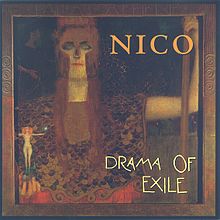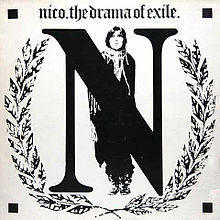- Drama of Exile
-
Drama of Exile 
Cover as it was used by Aura for their 1981 LP release, the album's first. Also used for subsequent CD releases by other labels, except the one from Cleopatra Records (see below).[1]Studio album by Nico Released 1981 Recorded April–May 1981
Music Works Studio, Watford, Hertfordshire, UKGenre Experimental, art rock Label Aura (1981 LP, UK),
Line (1987 CD, Germany),
Great Expectations (1992 CD, UK),
Cleopatra Records (1993 CD, US),
See for Miles Records (1996 CD, UK)[1]Producer Jean-Marc Philippe Quilichini Nico chronology The End...
(1974)Drama of Exile
(1981)Camera Obscura
(1985)Alternative cover  Cover as it was used by Cleopatra Records for their 1993 CD release.[1]
Cover as it was used by Cleopatra Records for their 1993 CD release.[1]Professional ratings Review scores Source Rating Allmusic 



 [2]
[2]Allmusic (remix) 



 [3]
[3]Drama of Exile or The Drama of Exile are titles used to refer to two rock albums by Nico recorded in 1981. The first album was originally recorded in April and May. The second album is a re-recording of the first one, recorded in May. The album featured a Middle Eastern rhythm section and was produced by Corsican reggae bassist Philippe Quilichini.
Contents
Genesis
After the release of The End in 1974, Nico's partnership with Island Records ended and she spent the majority of her time in New York City, without a record deal, appearing in a series of Philippe Garrel films.
She did, however, continue to write new songs and perform intermittently. "Purple Lips" featured in her solo sets as early as April 1975, and was also performed on French television that month and the lyrics of which were recited by Nico in the Philippe Garrel film Le Berceau de Cristal (1976). The earliest recorded performance of "Genghis Khan" dates to August 6, 1975, with non-LP "Procession" and "Henry Hudson" featuring in set lists from February 1977.
By March 1978, with "The Sphinx" also introduced into her set, Nico had settled on the title Drama of Exile and resolved to try a new style at odds with her previous harmonium-based sound. Nico continued to write and by early 1981 had enough songs ready to record a new album.
Recording
The original album was plagued by suspicious circumstances. There are different versions of the story, and the truth remains ambiguous.
During the recording a sound engineer stole the unfinished record and sold it to the company Aura which released it immediately. Of course we sued them. We re-recorded the album but the court trial took forever. I had neither money nor strength to go on. The most commonly sold version of Drama Of Exile is unauthorized. We released the original form with Invisible Records but only in a very small edition and so it’s more a collector’s item.— Jacques Pasquier [4]Aura offered to finance one album, to be recorded in London and produced by Philippe Quilichini. Contracts were drawn up, Aura advanced the production costs and recording began almost immediately. Recorded at Gooseberry Studios in Tulse Hill, London, with a band composed of Quilichini, guitarist Mahammad Hadi, drummer Steve Cordonna, Ian Dury's sax player Davey Payne, and Andy Clark, the keyboard player who so sparkled on David Bowie's Scary Monsters album. With the album nearly finished, and sounding great, A.S. [Aaron Sixx, head of Aura] received a tip-off from the studio that N. Duget (Nico's unofficial manager) had arranged to steal the master tapes from the studio and sell them, without reimbursing Aura. A.S. scuppered those plans by taking possession of all the tapes. A legal battle ensued, which was to last almost 3 years. Duget claimed Nico had not signed the contract. True, but an agreement was made and Aura had paid out considerable sums in production costs. Ownership therefore rested with Aura. During this period of legal machinations, Nico recorded a single "Sãeta/Vegas" which emerged on the Flicknife label in 1981. In 1982, Nico, tired of all the legal wranglings, abandoned N.D. and P.Q. and asked Aura to finally release the Drama of Exile album. At that time she also signed over the publishing rights to her original Drama songs to Aura Music. In 1983, having won the legal battle, Aura proceeded to release the album. P.Q. was angry and taking no notice of the legal restrictions involved, went back to Paris with some tapes he had secretly copied during recording, he remixed those tapes and had an illegal version of the album released in France. Aura quickly put a stop to this album and it was subsequently withdrawn.— Dave Thompson, liner notes of Nico-Icon CDQuilichini and his girlfriend also hatched a plan to steal the tapes in a bid to cheat Aura Records and sell them on to another company. Aaron Sixx managed to rescue them with a last minute dash to the studios, but with their plan thwarted the couple severely delayed the release of the album by trying to take him to court. But with the record finally released and lauded by many critics as her best ever, Nico embarked on the usual round of promotional interviews.— Fraser Massey, liner notes of Drama of Exile, UK CD edition 1996"It was all really boring, all that quiet stuff," Nico said of her past albums. "And having been a member of the Velvet Underground, rock'n'roll is something I have to do at some point, even if only for one album"... [Aura label head Aaron] Sixx admitted that Nico "didn't give a shit what happened to the LP, she just wanted the money for drugs." Yet despite these unconventional circumstances, Drama of Exile would see Nico receive some of the best reviews of her career.— Dave Thompson, Better to Burn Out: The Cult of Death in Rock 'N' Roll [5][page needed]The two versions had slightly different personnel and instrumentation. A version of the original LP recordings was released in 1981 by Aura Records in the Netherlands and Sweden only, several months after the debacle with the masters. The re-make was held up for two years, and was finally released in 1983 by Invisible Records. The original version of the LP was released on CD for the first time in Germany by Line Records in 1988, in the United States by Cleopatra Records in 1993 and in England by Great Expectations Records in 1989.
Track listing of original version
All tracks written by Nico except where noted.
Side one
- "Genghis Khan" – 3:52
- "Purple Lips" – 4:10
- "One More Chance" – 5:38
- "Henry Hudson" – 3:54
- "I'm Waiting for the Man" (Lou Reed) – 4:13
Side two
- "Sixty/Forty" – 4:50
- "The Sphinx" – 3:30
- "Orly Flight" – 3:55
- "Heroes" (lyrics by David Bowie, music by Bowie and Brian Eno) – 6:06
Personnel
- Nico – vocals
- Muhammad Hadi (Mad Sheer Khan) – lead guitar, fretless bouzouki, snitra, backing vocals, piano
- Philippe Quilichini – bass, African percussions, rhythm guitar, synthesizer, backing vocals
- Steve Cordona – drums
- Davey Payne – saxophones
- Andy Clark – organ, piano, synthesizer
Track listing of remake
The Drama of Exile 
One of the covers used for the release of the re-recorded version.[6]Studio album by Nico Released 1983 Recorded May 1981
Music Works Studio, Watford, Hertfordshire, UKGenre Experimental, art rock Label Invisible Records (1983 LP, France),
Tomk TK (1991 LP),
Buddah Records (1996 CD, France),
Tomk TK (1998 CD),
Rakos Records (2004 CD)[6]Producer Jean-Marc Philippe Quilichini Nico chronology The End...
(1974)Drama of Exile
(1981)Camera Obscura
(1985)All tracks written by Nico except where noted.
- "One More Chance" – 4:13
- "The Sphinx" – 4:00
- "Sãeta" – 3:40
- "Genghis Khan" – 3:34
- "Heroes" (lyrics by David Bowie, music by Bowie and Brian Eno) – 5:41
- "Henry Hudson" – 3:46
- "60/40" – 4:35
- "Orly Flight" – 2:48
- "Vegas" – 3:30
- "I'm Waiting For the Man" (Lou Reed) – 4:14
Personnel
For the remake, the lineup was the same but without Davey Payne, and with additional help from:
- J. J. Johnson – percussion, trumpet
- Thierry Matiozek – electric violin, backing vocals
- Gary Barnacle– saxophones, drums
References
- ^ a b c See this page from a fansite, which displays information of all releases of the original version.
- ^ Allmusic review
- ^ Allmusic (remix) review
- ^ "Interview with Jacques Pasquier". rakosrecords.cz. http://www.rakosrecords.cz/html/nico.htm.
- ^ Thompson, David (1998). Better to Burn Out: The Cult of Death in Rock 'N' Roll. ISBN 978-1560251903.
- ^ a b See this page from a fansite, which displays information of all releases of the re-recorded version.
Studio albums The Velvet Underground & Nico · Chelsea Girl · The Marble Index · Desertshore · The End... · Drama of Exile · Camera ObscuraLive albums Le Bataclan '72 · June 1, 1974 · Do or Die: Diary 1982 · Live Heroes · Behind the Iron Curtain · Nico's Last Concert: Fata MorganaCompilation albums Innocent and Vain: an Introduction to Nico · The Frozen Borderline – 1968–1970Categories:- 1981 albums
- Nico albums
Wikimedia Foundation. 2010.
